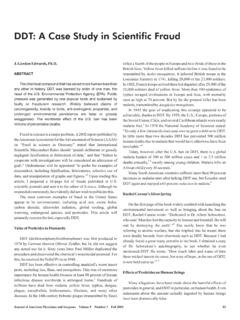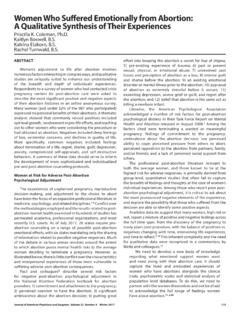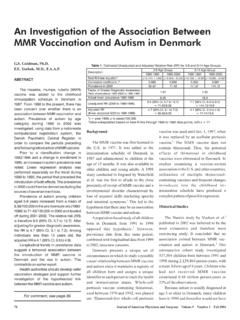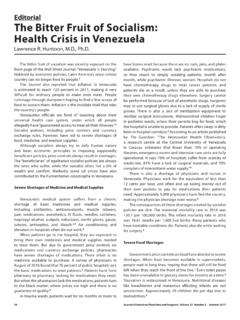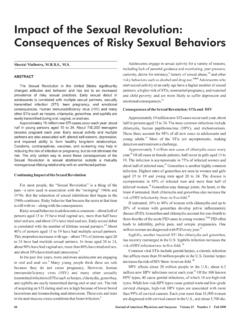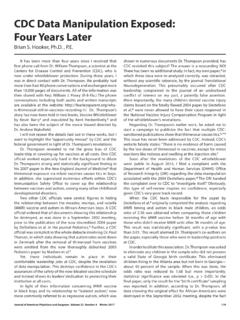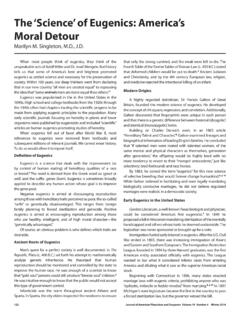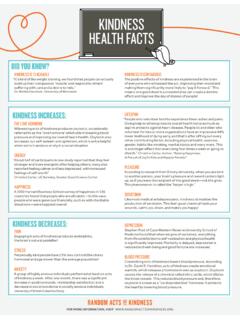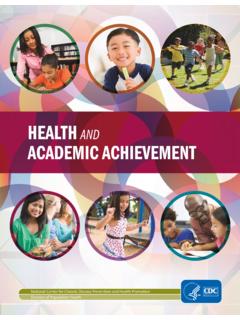Transcription of Women Who Suffered Emotionally from Abortion: A ...
1 113 Journal of American Physicians and Surgeons Volume 22 Number 4 Winter 2017 Women Who Suffered Emotionally from Abortion: A Qualitative Synthesis of Their ExperiencesPriscilla K. Coleman, Boswell, Etzkorn, Rachel Turnwald, ABSTRACTW omen s adjustment to life after abortion involves numerous factors interacting in complex ways, and qualitative studies are uniquely suited to enhance our understanding of the breadth and depth of individuals experiences. Respondents to a survey of Women who had contacted crisis pregnancy centers for post-abortion care were asked to describe the most significant positive and negative aspects of their abortion histories in an online anonymous survey. Many Women (just under 32% of the 987 who participated) expressed no personal benefits of their abortions.
2 A thematic analysis showed that commonly voiced positives included spiritual growth, involvement in pro-life efforts, and reaching out to other Women who were considering the procedure or had obtained an abortion. Negatives included deep feelings of loss, existential concerns, and declines in quality of life. More specifically, common negatives included feelings about termination of a life, regret, shame, guilt, depression, anxiety, compromised self-appraisals, and self-destructive behaviors. A summary of these data should serve to inform the development of more sophisticated and individualized pre-and post-abortion counseling protocols. Women at Risk for Adverse Post-AbortionPsychological AdjustmentThe experiences of unplanned pregnancy, reproductive decision-making, and adjustment to the choice to abort have been the focus of an expansive professional literature in medicine, psychology, and related Conflict over the methodologies employed and the results related to post-abortion mental health examined in hundreds of studies has permeated academia, professional organizations, and most recently courts.
3 As of July 2017, 20 states require pre-abortion counseling on a range of possible post-abortion emotional effects, with six states mandating only the sharing of information related to possible negative responses. Much of the debate in various arenas revolves around the extent to which abortion poses mental health risks to the average woman deciding to terminate a pregnancy. However, as illustrated below, there is little conflict over the characteristics and interpersonal experiences of those most vulnerable to suffering adverse post-abortion consequences. Paul and colleagues6 describe several risk factors for negative post-abortion psychological adjustment in the National Abortion Federation textbook for abortion providers: 1) commitment and attachment to the pregnancy; 2) perceived coercion to have the abortion; 3) significant ambivalence about the abortion decision; 4) putting great effort into keeping the abortion a secret for fear of stigma; 5) pre-existing experience of trauma; 6) past or present sexual, physical, or emotional abuse; 7) unresolved past losses and perception of abortion as a loss; 8) intense guilt and shame before the abortion; 9) an existing emotional disorder or mental illness prior to the abortion.
4 10) appraisal of abortion as extremely stressful before it occurs; 11) expecting depression, severe grief or guilt, and regret after the abortion; and 12) belief that abortion is the same act as killing a newborn infant. Likewise, the American Psychological Association acknowledged a number of risk factors for post-abortion psychological distress in their Task Force Report on Mental Health and Abortion released in August Among the factors cited were terminating a wanted or meaningful pregnancy; feelings of commitment to the pregnancy; ambivalence about the abortion decision; low perceived ability to cope; perceived pressure from others to abort; perceived opposition to the abortion from partners, family, and/or friends.
5 And a lack of perceived social support from professional post-abortion literature relevant to both the average woman, and those known to be at the highest risk for adverse responses, is primarily derived from group-level, quantitative studies that often fail to capture the breadth of feelings and thoughts at the core of Women s individual experiences. Among those who report poor post-abortion psychological adjustment, it is critical to ask about the most pronounced negative elements of the experience, and explore the possibility that those who Suffered from the decision are able to identify some positive data do suggest that many Women , high risk or not, report a mixture of positive and negative feelings across the full time span, from the discovery of the pregnancy to many years post-procedure, with the balance of positives vs.
6 Negatives changing with time, intervening life experiences, and time to This inherent complexity and the need for qualitative data were recognized in a commentary by Weitz and need to develop a new body of knowledge regarding what emotional support Women want and need along with their abortion care. It should capture the lived and embodied experiences of Women who have abortions alongside the clinical trials, psychometric scales and statistical analysis of population level databases. To do this, we need to partner with the Women themselves and not be afraid to acknowledge the full range of feelings Women have about , p 88114 Journal of American Physicians and Surgeons Volume 22 Number 4 Winter 2017 Significant insight about distinct emotional trajectories has come from qualitative, albeit small-scale, investigations.
7 Goodwin and Ogden8 conducted an interpretative phenomenological analysis based on transcripts of 10 interviews with Women who had experienced an abortion from 1 to 9 years prior. The authors observed that although a few Women reported a linear pattern of change in their emotions, many described more variable patterns including persistent negative emotions across many years, negative reappraisal at some point post-abortion, and positive appraisal at the time of the abortion with no subsequent negative emotions. Moreover, the authors noted that emotional changes following an abortion were largely based on the personal and social context. For example, their results suggested that persistent post-abortion emotional upset was associated with viewing the fetus as a human being, lack of social support, and belief that society is judgmental or fails to understand the psychological impact of abortion on related to continuing versus terminating an unplanned pregnancy may partially explain why even Women who experience the most severe negative effects are able to see a silver lining and identify some positive abortion-related outcomes, particularly as time elapses.
8 Ambivalence regarding reproductive decision-making is likely one of the most common risk factors for mental health problems. Research by Husfeldt et indicated that 44% of the Women surveyed had doubts about their decision when the pregnancy was confirmed, and 30% continued to express doubts when the abortion date arrived. More recently Kjelsvik and Gjengedal13 reported that studies show 25 30% of Women feel ambivalent and find the abortion decision difficult to make. Given the sheer number of universally accepted risk factors for adverse post-abortion mental health consequences, the population of Women most at risk is not small, and they are deserving of more focused research attention. Very few qualitative studies have been published capturing the range of personal experiences of Women who abort, particularly among those who have Suffered enough to seek out post-abortion counseling services.
9 Most qualitative studies are small, with the vast majority involving fewer than 50 Moreover, available qualitative studies on abortion experiences suffer from a lack of diversity, typically sampling only single Women in their teens and 20s, and very few qualitative studies examine long-term post-abortion With every unintended pregnancy representing a unique situation defined by the individual s history, personality, belief system, relationships, financial situation, and future plans, qualitative studies offer a unique opportunity to delve deeply into Women s feelings about the experience. A woman s choice to abort and adjustment to life afterwards involves numerous factors interacting in complex ways, with qualitative studies potentially lending insight into these interactions.
10 In the current study , the researchers endeavored to listen to the voices of Women using minimal prompting to more fully understand their experiences. This study is specifically a thematic analysis of responses from a large sample of participants (n=987) in a nationwide survey, wherein the Women described the most significant positive and negative aspects of their abortion experiences. No previous studies of this size, using a qualitative methodology based on open-ended responses from Women , who have sought post-abortion care from a crisis pregnancy center, have been conducted. Broad questions posed in a safe context were expected to bring deeper understanding of the concerns and pains experienced by Women who were not able to enter and leave an abortion facility unscathed.
